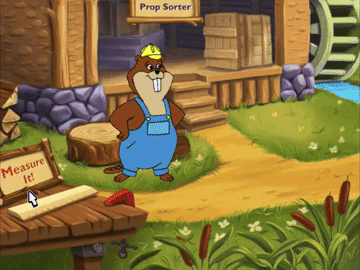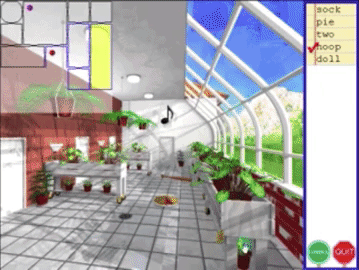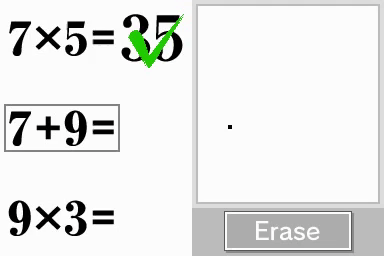As a child of the late 1990s/early 2000s with access to a PC both at home and in-school, educational video games have been a part of my DNA for as long as I can remember. From iconic learning game franchises like Reader Rabbit to education-focused spin-offs of famed television shows like Little Bear, countless hours of my youth were spent immersed in digital game-based learning worlds similar to the experiences we create here at Filament Games.

Reader Rabbit, a game-based learning icon.
In celebration of my one year work anniversary, I thought I’d take a moment to sit back and reflect on some of the most memorable learning games from my childhood. These games weren’t necessarily the most popular games of their time – rather, I vividly remember the following titles as formative digital experiences which helped develop many of my interests, passions, and tastes in both learning and commercial games. Without further ado, let’s jump right in…
Reading Mansion (Great Wave Software, 1998)
California-based Great Wave Software’s Reading Mansion is certainly not nearly as recognizable as other learning game classics like The Oregon Trail or the long-running Carmen Sandiego series – however I still owe much of my interest in game-based learning to this unsettlingly strange ELA title. Released in 1998 for Macintosh and Windows PCs, Reading Mansion is a Myst-like graphic adventure puzzle game that lets players explore the rooms and corridors of an expansive mansion, teaching basic phonics, word skills, and other language arts fundamentals through mini-games scattered throughout the 3D environments. To be totally honest – the actual “learning” aspects of the game are a bit dull, often amounting to simple multiple choice questions that simply don’t hold up in comparison to the educational games of the 21st century. However, my younger self was endlessly fascinated by the idea of exploring the secrets hidden within the mansion, causing me to actively participate in the learning mini-games without even realizing that I was hooked. 20 years after Reading Mansion’s release, learning game developers are far more fluent in what makes great learning games – but the concept of transporting learners to a new, mysterious environment in an effort to capture (and retain) their interest remains one of my favorite aspects of high-quality learning games to this day. For more modern examples of captivating environments in educational games, see Triseum’s calculus learning game Variant: Limits and our recently released VR exclusive Breaking Boundaries in Science.

Lemonade Stand (Minnesota Educational Computing Consortium, 1973)
A true classic in the world of educational video games – growing up, myself and my peers spent countless hours playing Lemonade Stand in school and in our free time. Unlike Reading Mansion, Lemonade Stand effortlessly blends simple game mechanics with complex business learning objectives, culminating in a tremendously satisfying gameplay experience that can be played over and over again. Did your lemonade stand go out of business on day 3? Tough luck – but you’re immediately prompted to try again! Lemonade Stand actively encourages players to embrace failure through trial and error, prompting players to learn from their mistakes and utilize their past failures as ammunition to better optimize their future lemonade stand operation strategies. Lemonade Stand is a great example of effective learning game design principles at work – and best of all, you can still play it on the web!

Brain Age: Train Your Brain in Minutes a Day! (Nintendo SPD, 2006)
By far the most modern game on this list, famed Nintendo DS game Brain Age: Train Your Brain in Minutes a Day!was something of a phenomenon upon its 2006 release in the United States. Created in collaboration with Japanese neuroscientist Dr. Ryuta Kawashima, Brain Age encourages players to complete daily challenges, math exercises, and Sudoku puzzles in an effort to stimulate activity in certain areas of the brain. What I found most fascinating about Brain Age was its control scheme and inherent portability as a Nintendo DS game. Released in 2006, Brain Age preceded both the original iPhone and Android mobile operating system, meaning that at this point most in the US were familiar with touch screen devices, yet likely didn’t carry one around in their pocket with any regularity. Brain Age’s touchscreen-only interface was not only incredibly intuitive – I believe it helped set the standard for later touchscreen-native educational iOS and Android games and apps as well. Prior to the release of Brain Age, educational games were seldomly released for portable gaming consoles and devices. Today, the App Store and Google Play Store are teeming with learning games and apps – the recently-released Nintendo Switch even boasts a solid library of educational titles, and that’s after less than two years on the market. As new technologies like AR and VR enter the EdTech fray, the possibilities for all-new digital learning experiences will continue to expand rapidly – leading to high-quality, immersive, on-the-go learning experiences.

Playing the above learning games as a child steered me towards many of my long term interests and passions. I’m hopeful that our games are similarly inspiring the next generation of leaders to explore their innate curiosities, embrace failure as an opportunity to learn and try again, and gain the skills they need to use and understand the technologies of the present and future.
Have you played any of the games I listed? Want to share your all-time favorite learning games with our team? Find us on Twitter or Facebook and join the conversation!
Check out some of our other popular blogs:
RIGGED: Experience Life as an Underserved Youth in America
Five Brilliant Game-based Learning TED Talks
5 Excellent Educational Games for the Nintendo Switch
Why Virtual Reality May Be The Tech to Bridge Generations
Inspiring Educators in Game-based Learning